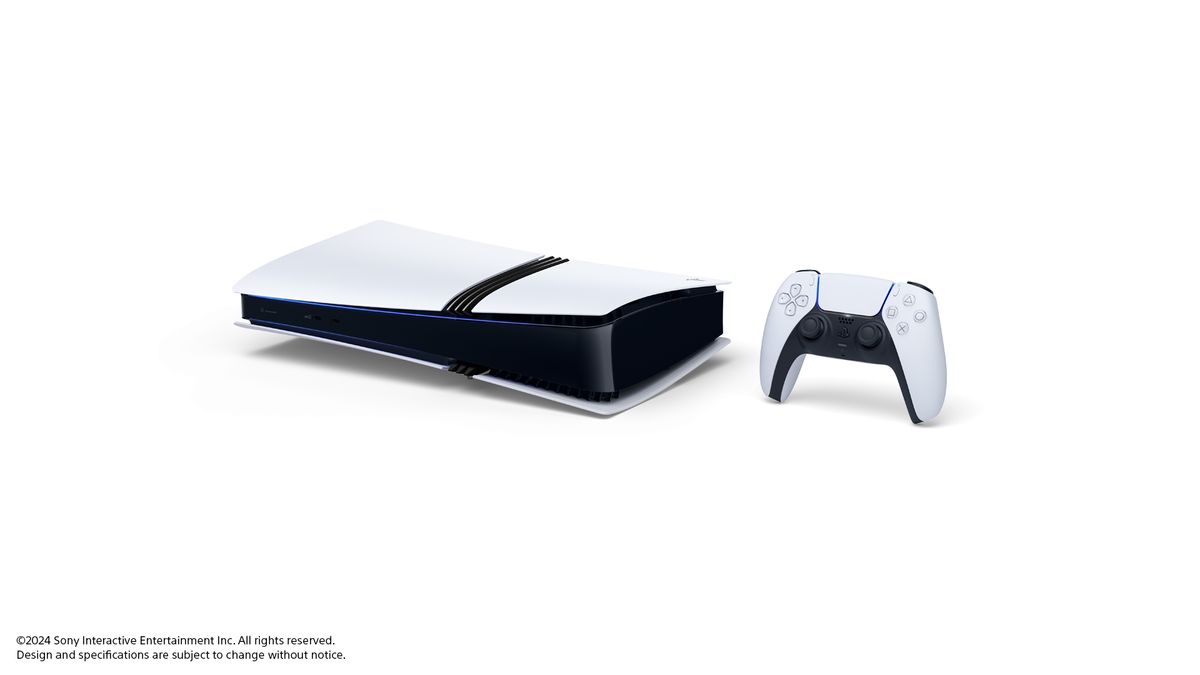
The PS5 Pro is an impressive piece of technology from Sony Interactive Entertainment. Arriving almost four years after the original PS5 release date of November 12, 2020, the redesigned system has been positioned by PlayStation as the ultimate place to play – the potential for greater fidelity and higher frame rates without compromise across many of the best PS5 games, unlocked by the advent of a more powerful GPU and new proprietary technology. A high-end version of the PS5 is a nice luxury to have here in 2024, but I can't say that it was one that I was necessarily desperate for.
The same couldn't necessarily be said about the PS4 Pro. When that system arrived in 2016, it was PlayStation's answer to the wider proliferation of affordable 4K-ready television sets, and a solution to the problem created by the launch of PS VR – virtual reality succeeds when total immersion is achieved, and lackluster stability on standard PS4 systems could quickly shatter the illusion of stepping through virtual worlds. The PS4 Pro was never truly essential, but for those who Sony were at risk of losing to the PC gaming community (where fidelity and performance advances can be more meticulously maintained) the system surely extended the lifespan of the eighth generation of home consoles. I know that that's why I invested in one at first opportunity, and never once regretted my decision to upgrade.
Whether I'll leap onto a PS5 Pro purchase this year remains to be seen. With a recommended retail price of $700/£700, the mid-generation refresh needs to easily justify its existence – something which Sony is yet to achieve. It doesn't help that, as an industry, video games are being delivered to such a high quality that such a powerful system is only able to (seemingly) deliver marginal increases to visual and overall performance values. It's undoubtedly true that we haven't seen a stark graphical leap in fidelity since the Xbox 360 and PS3 ushered in the HD-era back in 2005, and likely that we will never experience anything like that again.

Video game creators could make an active drive towards photorealism, but my understanding is that this initiative is limited more by creative ambition than it is hardware limitations – models in Gran Turismo 7, environments in Death Stranding, animation in Horizon Forbidden West demonstrate that this is (to an extent) already within reach. What we've seen instead of some great graphical revolution are steady steps forward as developers reach for wider worlds, more densely detailed playspaces, and more predictable performance. This sense of gradual improvement is perhaps best encapsulated by Naughty Dog: The Last of Us (PS3, 2013) still holds up, The Last of Us Remastered (PS4, 2014) remains pretty solid, The Last of Us: Part 1 (PS5, 2024) is phenomenal, and The Last of Us: Part 1 Enhanced for PS5 Pro will likely be phenomenal+.
PlayStation (and Xbox, to a lesser extent) has continued to posit that ray-tracing is the next notable advance. If you can remember back to 2019, it seemed to be a constant source of discussion in advance of the PS5 and Xbox Series X – although I think it's safe to say that it has become less prominent as a talking point as players grapple with the trade-offs to resolution and framerate required to properly support the feature. Sony maintains that the PS5 Pro will solve this problem, but I'll be honest with you here and admit that I don't really see the broad benefit of ray tracing yet. I can only recount two occasions where I've really noticed what ray-tracing is capable with my own two eyes: playing Cyberpunk 2077 on a friend's supercomputer, and one Gamescom where I played Watch Dogs Legion next to a representative from NVIDIA who spent the entire 30 minute session toggling ray-tracing on and off every couple of seconds.
The ability to simulate how light behaves in the real world is neat. And Sony's promise that the PS5 Pro will deliver Advanced Ray Tracing – "more dynamic reflection and refraction of light [to allow] the rays to be cast at double, and at times triple, the speeds of the current PS5 console" – has certainly piqued my interest, but it's something I'll need to experience myself before I let it inform such a significant purchasing decision.
Time to start saving?

All confirmed PS5 Pro enhanced games coming to the new Sony console
I have very few complaints regarding the quality of games on PS5, particularly from first-party developers working under the PlayStation Studios banner and third-party groups delivering fantastic platform exclusives. There are outliers of course but, on the whole, I have enjoyed this 4K-enabled era of video games, and I'm yet to play a PS5 game that has truly pushed the system to breaking point (as, it could be argued, some were beginning to do on launch PS4s by the time the Pro arrived). Who knows, maybe Sony is preempting the release of power-hungry games like GTA 6, Monster Hunter Wilds, and Death Stranding 2: On the Beach with the PS5 Pro, although that remains to be seen at this early stage.
Sign up to the 12DOVE Newsletter
Weekly digests, tales from the communities you love, and more
If I have any source of frustration with the current generation of play, it's that many video games are still making me choose between Performance and Quality at startup – locked frames-per-second or native resolution, whatever it may be. I'm not going to get into a tiresome 120fps versus 60fps versus 30fps debate, or the value of 4K 30fps versus 1080p 60fps, or the various other permeations of this which prove to be pervasive in the modern era – this argument often loses sight of developer intent, as there are occasions where a studio may want to put limits in place for specific effect. But the important thing to understand here is that the PS5 Pro is specifically designed to take the choice between Performance and Quality modes out of our hands.
The PS5 Pro is equipped with an upgraded GPU and new system architecture, which combined will purportedly allow for higher fidelity graphics with smoother frame rates at 60FPS. I think if we are all really honest, many expected that the PS5 and Xbox Series X would end the Performance versus Quality mode debate which was ushered in more broadly with the PS4 Pro and Xbox One X. The fact that Sony now says it has a solution to this certainly piques my interest, especially as this should ensure more consistent, stable video game experiences for everybody moving forward. But again we come back to price.

The PS5 Pro costs $699.99 / £699.99. That's a lot of money, particularly when the PS5 Digital Edition is retailing for $449. It makes the idea of upgrading seem pretty unassailable, as what we're being offered are really key quality-of-life improvements, but nothing that's necessarily going to change the way I view my video games forever. It certainly doesn't help that Sony doesn't have a great deal of exclusive upcoming PS5 games announced that can really showcase what this system can do, and the thought of going back through titles that I've already played with enhanced resolution/framerate isn't making me rush to a calculator to see if I could even afford such a costly machine.
All of that's to say that I'm on the fence for the PS5 Pro more than I expected to be. I really like the idea of a machine that can more consistently deliver high-quality experiences without a noticeable detriment to fidelity or performance, but at $700 I suppose I expected a little bit more – especially when my launch PS5 is yet to present any real issues. Maybe my mind will be made up once I get to play a PS5 Pro enhanced game for myself, but right now I'm struggling to justify the upgrade expense far more than I ever did when I traded in my PS4 for a PS4 Pro back in 2016.

Josh West is the Editor-in-Chief of 12DOVE. He has over 15 years experience in online and print journalism, and holds a BA (Hons) in Journalism and Feature Writing. Prior to starting his current position, Josh has served as GR+'s Features Editor and Deputy Editor of games™ magazine, and has freelanced for numerous publications including 3D Artist, Edge magazine, iCreate, Metal Hammer, Play, Retro Gamer, and SFX. Additionally, he has appeared on the BBC and ITV to provide expert comment, written for Scholastic books, edited a book for Hachette, and worked as the Assistant Producer of the Future Games Show. In his spare time, Josh likes to play bass guitar and video games. Years ago, he was in a few movies and TV shows that you've definitely seen but will never be able to spot him in.

Final Fantasy 7 Remake and Rebirth battle director says combining everything he learned on Monster Hunter: World with Square Enix's technology and unique skills created a "chemical reaction"

"Minutes after Palworld released," Pocketpair was already getting game pitches from "some really big names" before it even set up its own publisher: "No one has money at the moment"










